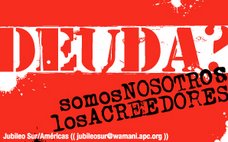Within a long announced decision, the IDB Board of Governors met in Guatemala and approved the partial cancellation of debts claimed from five of the poorest countries in the region, Haiti, Honduras, Nicaragua, Guyana, and Bolivia. Although the IDB decision comes as a response to the campaign promoted by Jubilee South and other networks and movements in those countries and all around the world to demand the total and unconditional cancellation of debts, we cannot accept its terms nor the expectation created around it.
In order to benefit the affected population, any debt “relief” initiative should contribute to break the economic and political dependence suffered by Southern countries, by promoting the sovereignty and self-determination of nations and the full force of human and environmental rights. It should also acknowledge the illegitimacy of debts claimed, most of which were taken by non-constitutional or corrupt governments, without asking for the opinion of the population and for the purpose of implementing the adjustment, privatisation, loot and liberalisation policies that Latin American peoples have been denouncing as being genocide.
The “forgiveness” of debts approved by the IDB does not seem to be along these lines. Rather, it seems to conform to the history of debt reductions engineered by lenders themselves, which have brought relief for large capitalists anxious to keep on concentrating wealth as well as increased conditionalities and difficulties to be faced by nations. In addition to the fact that these are partial reductions of debts whose legitimacy has not been questioned, the requirement for strong political and economic conditionalities remains in force and the availability of future loans shall be reduced in direct proportion to the amounts currently being cancelled.
This is the case of Haiti, for example, when the IDB ratifies that in order to have access to debt cancellation, the country has to comply with all neo-liberal recipes and indicators within the Highly Indebted Poor Country (HIPC) Programme. Camille Chalmers, of the Haitian Platform for an Alternative Development (PAPDA), expressed concern over the strong constraint posed by the fact that “no guarantees” are attached to the announced debt writing-off: “Once again, these promises by the IDB fail to solve the debt crisis. They impose two more years of the same policies that are killing us. ECLAC’s report indicates that last year the Haitian economy transferred over 70 million dollars overseas, mostly to pay-off illegitimate and criminal debts. This scandal must stop now. This devastated country cannot continue to export capital”.
For countries like Bolivia and Nicaragua, the conditions required to have access to this and previous debt reductions, have implied the privatisation of resources and basic services, a huge social de-investment and a rapid increase in domestic debt. Current negotiations between the IMF and the Nicaraguan government aim to ensure domestic debt holders are the first ones to collect the “savings” the country may obtain as a result of the IDB decision. Alejandro Bendaña, of the Centre for International Studies in Nicaragua, reported that “the so-called relief allows the government of Nicaragua to pay – without conditions – the full amount of an illegitimate and illegal domestic debt in the hands of national and international bankers, while maintaining payment of the outstanding external debt”.
“The right thing would be to cancel the total amount of debt claimed by the IDB – added Bendaña – rather than simply granting some relief. We should demand a comprehensive social Audit of all these debts, ir order to determine the amounts we have already paid in excess”.
“Haiti and the five countries should not pay a single penny more for an illegitimate debt” – also demanded Chalmers. “It is our countries that are the creditors and we should revert the looting and impoverishment that are the real causes of the present situation”.
It is certainly not a coincidence that “forgiveness” is granted for debts that should in fact be “repudiated”, while the IDB discusses the restructuring of its operations within a framework of strong controversy over its mandate and role, together with that of all Multilateral Trade and Financial Institutions such as the IMF, WB, CAF and WTO. Besides, the US refuses to grant additional resources while alternatives such as a Southern Solidary Bank are being launched in the region.
Precisely this “relief” including a few debts and reducing the Bank’s exposure and the size of its concessional loan portfolio, has to be analysed together with the IDB attempts to facilitate its operation and continue to expand its role as “Bank of Integration”. Whether it is through the Plan Puebla-Panama or IIRSA, in the promotion of free trade agreements or extractive and energy mega-projects, it turns out to be likewise deplorable that the IDB continues to strengthen its role as public financing agency for the regional and international financial oligarchy. Alejandro Bendaña sums up the recent experience in Central America by noticing that “the wrongly called ‘non-sovereign’ loans – credits directly granted to private companies – have doubled their amounts between 2004 and 2006, while Central American states, with the exception of Costa Rica and Panama, show the lowest public investment levels in Latin America. The Bank has little to do with ‘development’ when more than 4 billion dollars in IDB loans have not managed to impact on poverty levels since in most parts of Central America two-thirds of the population are living in poverty, including most indigenous peoples”.
While the IDB offers debt “relief” to reinforce other forms of dependence, from Jubilee South/Americas we call upon all the people of the region to strengthen resistance to its debt and loot policies, by bluntly rejecting its projects, promoting comprehensive and participative audits to show who the true creditors are and demanding the governments truth and justice concerning those who are responsible for economic terrorism together with alternative policies regarding life, sovereignty and dignity.
JUBILEE SOUTH
Regional Latin America and Caribbean Coordination
Suscribirse a:
Enviar comentarios (Atom)

No hay comentarios:
Publicar un comentario